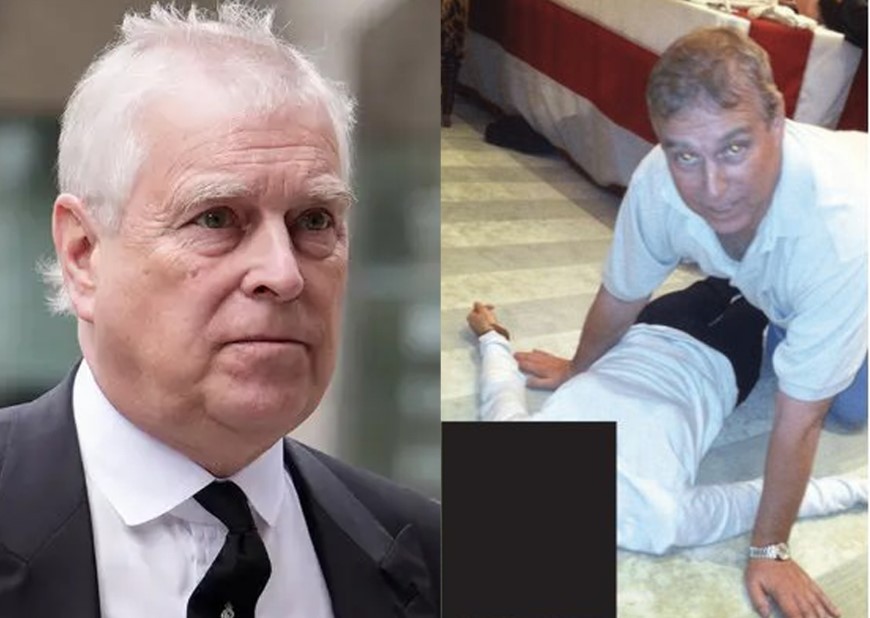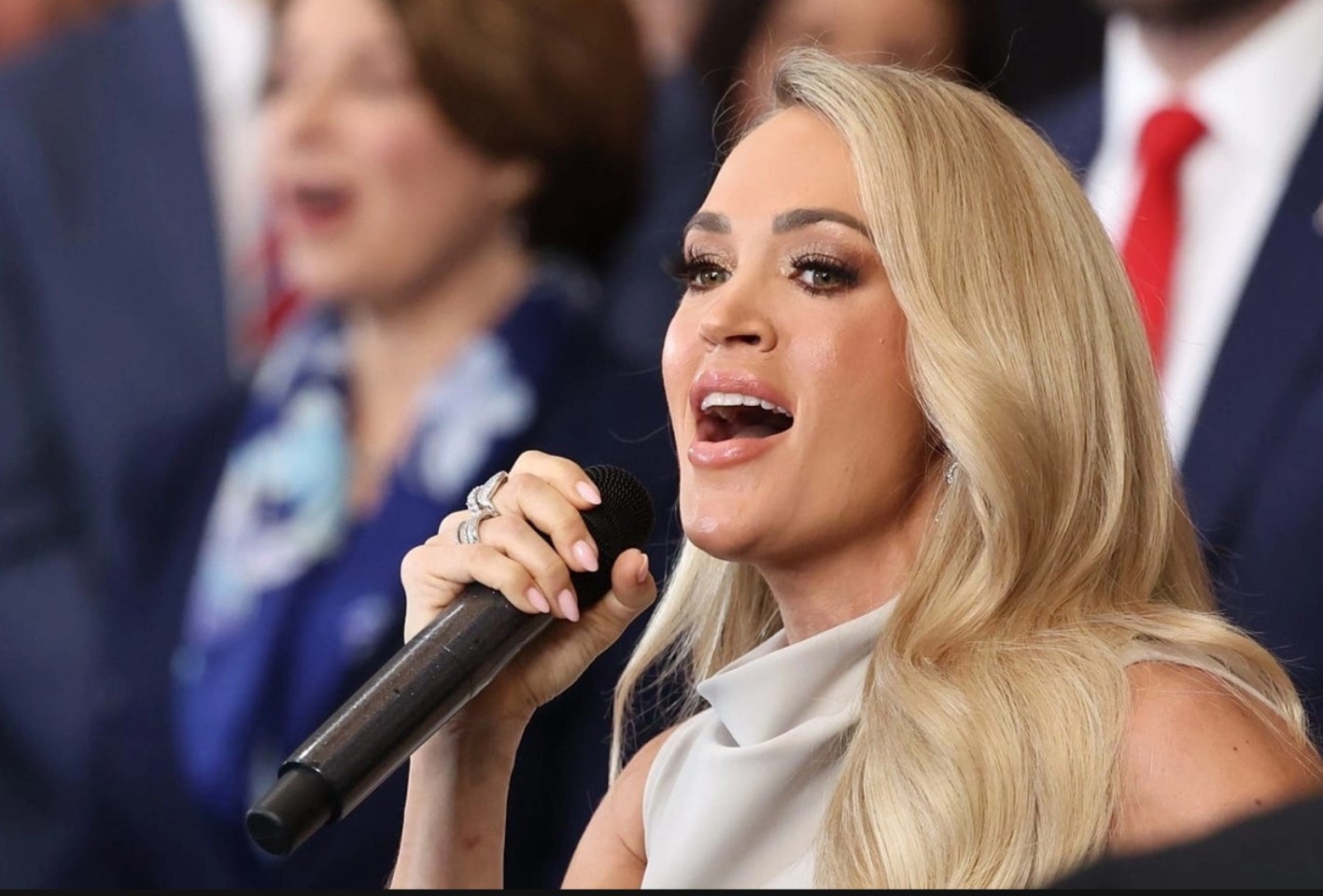Top 10 Best and Greatest Poems In English Language Of All Time
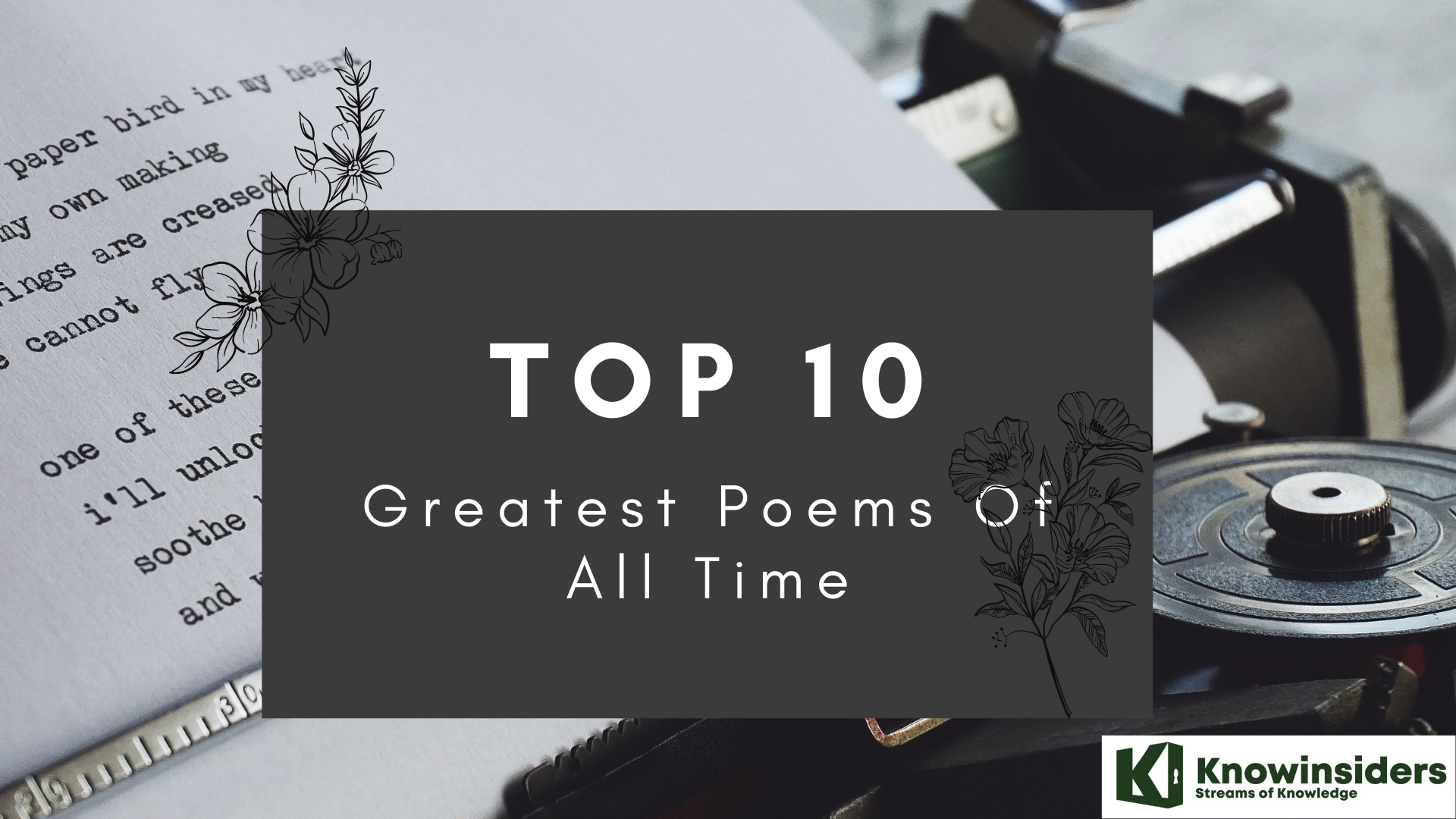 |
| Top 10 Greatest Poems of All Time In English Language |
| Table Content |
What is Poetry and How is Great Poetry?
What is poetry and how do we define what makes a poem great? According to Merriam-Webster, poetry is “writing that formulates a concentrated imaginative awareness of experience in language chosen and arranged to create a specific emotional response through meaning, sound, and rhythm.”
Henry Wadsworth Longfellow: "Come, read to me some poem, Some simple and heartfelt lay, That shall soothe this restless feeling, And banish the thoughts of the day’". The meaning or representation of great poetry will be reflected in the following poems but first, there are certain qualities that these poems have in common. For poetry to be deemed as ‘great’ or ‘the best’ these qualities are non-negotiable for the poet.
The Criteria
We have looked through websites, social media and poem lovers groups, and asked some of our experts, which helped us come up with this list of top 10 greatest poems of all time written in English language. The Criteria in cluding: Awareness, Intangible Imagination and Application.
In addition, to rank this list, the following criteria was used: Poems that have "stood the test of time"; Each poem's ranking is based off of its relative fame within the English language; In order to create more even ground for comparison, we have not included in this list nursery rhymes, etc.
However, many great poems and poets had to be left off of this list. In essence, if you feel a particular poem was excluded from or should be stripped from this list, you are entitled to create your list depending on how you see fit.
Each poem is followed by some brief analysis.
The list of 10 best and greatest poems of all time
10. “The Road Not Taken” by Robert Frost
9. “The New Colossus” by Emma Lazarus
8. “Power” by Audre Lorde
7. “i carry your heart with me” by e.e. cummings
6. “The Wasted Land” by T.S.Eliot
5. “The Red Wheelbarrow” by William Carlos Williams
4. “Ozymandias” by Percy Bysshe Shelley
3. “Daffodils” by William Wordsworth
2. “Holy Sonnet 10: Death, Be Not Proud” by John Donne
1. “Sonnet 18” by William Shakespeare
***
What Is Great Poetry?Awareness: The poet must possess an acute awareness of experience. For this to be true, he/she must be mentally stimulated or conscious whilst paying grave attention to diverse experiences as well as their emotional impacts. In essence, the poet needs to be properly conscious, smart, and aware as no dullard ever wrote great poetry in the history of poetry. Intangible Imagination: The poet must have an imagination so fanciful and creative that it incites multiple relationships between experiences. These relationships are brand new and unique but their reality had never been mentally conceived by anyone else. In other words, the poet must be able to create new metaphors and meanings as it is believed that a poem without fresh metaphors isn’t a good one and one without any metaphors at all shouldn’t be called poetry, regardless of its elements, meaning, form, devices, or emotional impact. Application: The poet must be able to apply those metaphors into words, thereby amplifying the impact of the scenario which evokes the precise emotional impact that’s intended by the poet, in the reader. This is done by choosing and applying the words, exploring sounds, and the use of rhythms as intentionally as songwriters of great song lyrics do when they’re strategically analyzing the emotional implication of every word, sentence, sound, rhythm, pause, and the unified arrangement of it. Source: Scientific Editing |
What are the best and greatest poems of all time?
10. “The Road Not Taken” by Robert Frost
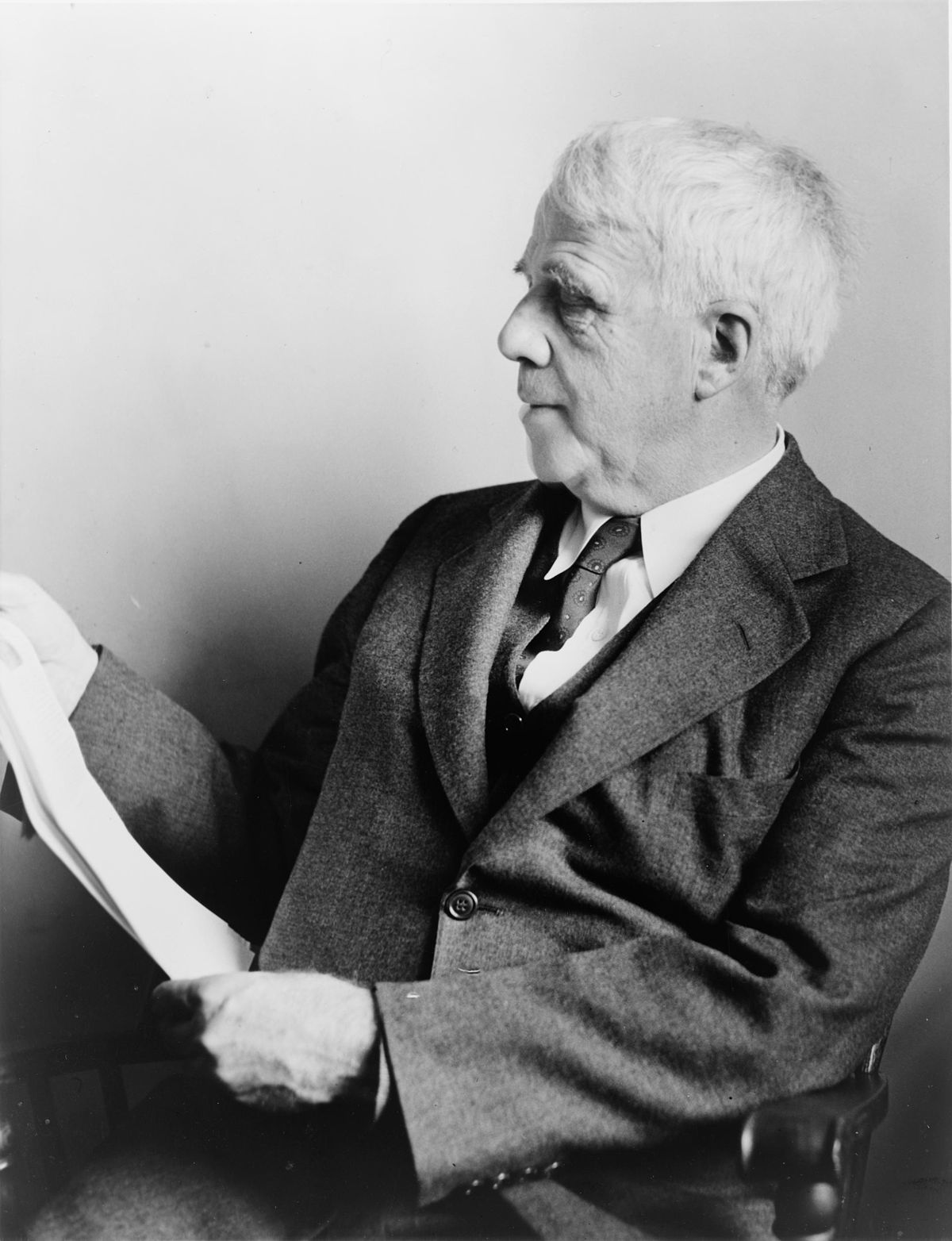 |
| Photo: Wikipedia |
Two roads diverged in a yellow wood,
And sorry I could not travel both
And be one traveler, long I stood
And looked down one as far as I could
To where it bent in the undergrowth;
Then took the other, as just as fair,
And having perhaps the better claim,
Because it was grassy and wanted wear;
Though as for that the passing there
Had worn them really about the same,
And both that morning equally lay
In leaves no step had trodden black.
Oh, I kept the first for another day!
Yet knowing how way leads on to way,
I doubted if I should ever come back.
I shall be telling this with a sigh
Somewhere ages and ages hence:
Two roads diverged in a wood, and I—
I took the one less traveled by,
And that has made all the difference.
"The Road Not Taken" is an ambiguous poem that allows the reader to think about choices in life, whether to go with the mainstream or go it alone. If life is a journey, this poem highlights those times in life when a decision has to be made. Which way will you go?
The ambiguity springs from the question of free will versus determinism, whether the speaker in the poem consciously decides to take the road that is off the beaten track or only does so because he doesn't fancy the road with the bend in it. External factors therefore make up his mind for him, according to the analysis from Owlcation.
Robert Frost wrote this poem to highlight a trait of, and poke fun at, his friend Edward Thomas, an English-Welsh poet, who, when out walking with Frost in England would often regret not having taken a different path. Thomas would sigh over what they might have seen and done, and Frost thought this quaintly romantic.
"The Road Not Taken" is all about what did not happen: This person, faced with an important conscious decision, chose the least popular, the path of most resistance. He was destined to go down one, regretted not being able to take both, so he sacrificed one for the other.
Ultimately, the reader is left to make up their own mind about the emotional state of the speaker at the end. Was the choice of the road less travelled a positive one? It certainly made "all the difference," but Frost does not make it clear just what this difference is.
All of Robert Frost's poems can be found in this exceptional book, The Collected Poems, which I use for all my analyses. It contains all of his classics and more. It's the most comprehensive collection currently on offer.
9. “The New Colossus” by Emma Lazarus
Not like the brazen giant of Greek fame,
With conquering limbs astride from land to land;
Here at our sea-washed, sunset gates shall stand
A mighty woman with a torch, whose flame
Is the imprisoned lightning, and her name
Mother of Exiles. From her beacon-hand
Glows world-wide welcome; her mild eyes command
The air-bridged harbor that twin cities frame.
“Keep, ancient lands, your storied pomp!” cries she
With silent lips. “Give me your tired, your poor,
Your huddled masses yearning to breathe free,
The wretched refuse of your teeming shore.
Send these, the homeless, tempest-tost to me,
I lift my lamp beside the golden door!”
One cannot analyze this poem without first looking at its title, which refers to the statue of the Greek god Helios that once stood at the harbor in Rhodes, Greece, over two thousand years ago. The title also claims that the Statue of Liberty is a replacement of sorts for the old Greek statue; the poet does this by including the word “new” in the title. Lazarus makes mention of the ancient statue in the first and second lines of the poem. She writes, “Not like the brazen giant of Greek fame,/With conquering limbs astride from land to land…”
Next, Lazarus’ The New Colossus is an example of a Petrarchan sonnet. The poem is fourteen lines long, and the first eight lines, called an octave, have the rhyme scheme abbaabba. The last six lines, called a sestet, have a rhyme scheme of cdcdcd.
As stated earlier, the speaker of the poem, presumably Lazarus, compares the Statue of Liberty to the Colossus. She says that unlike the giant statute the Greeks made, America’s statue will be of “A mighty woman with a torch,/ whose flame is the imprisoned lightning…” Also in these lines, she stresses that the Statue of Liberty will be welcoming, whereas the Colossus was meant to intimidate those who reached Greece’s shores. In addition, Lazarus personifies the statue, giving her the ability to “welcome” and “command.”
In lines five and six, Lazarus creates a new name for the Statue of Liberty: “…and her name/Mother of Exiles.” Since an exile is someone who is forced to leave their homeland, Lazarus is explaining that Lady Liberty will not only welcome those exiles, but she will also be mother-like to them, comforting and supporting them like every good mother does. She extends this thought into the next line, stating that the hand holding the torch “glows world-wide welcome.” In other words, her torch is lighting the way for all to see.
At the end of line seven, Lazarus writes, “…her mild eyes command/The air-bridged harbor that twin cities frame.” There has been much discussion behind this. Many people believe the twin cities the statute is commanding are New York City and Brooklyn, but others believe the cities could be New York City and Jersey City, New York’s neighbor across the river.
The last six lines of the poem are the most famous, and in these lines, the Statute of Liberty is talking “with silent lips.” She says,
Give me your tired, your poor,
Your huddled masses yearning to breathe free,
The wretched refuse of your teeming shore.
Send these, the homeless, tempest-tost to me.
I lift my lamp beside the golden door.
In these lines, the new Colossus is telling the world to give her all of the people who are longing for freedom, regardless of how they are—tired or poor, it makes no difference. She has lifted her light beside the door to let them all in.
‘The Crown of Literature is indeed poetry’- Victorian Poet, Matthew Arnold |
8. “Power” by Audre Lorde
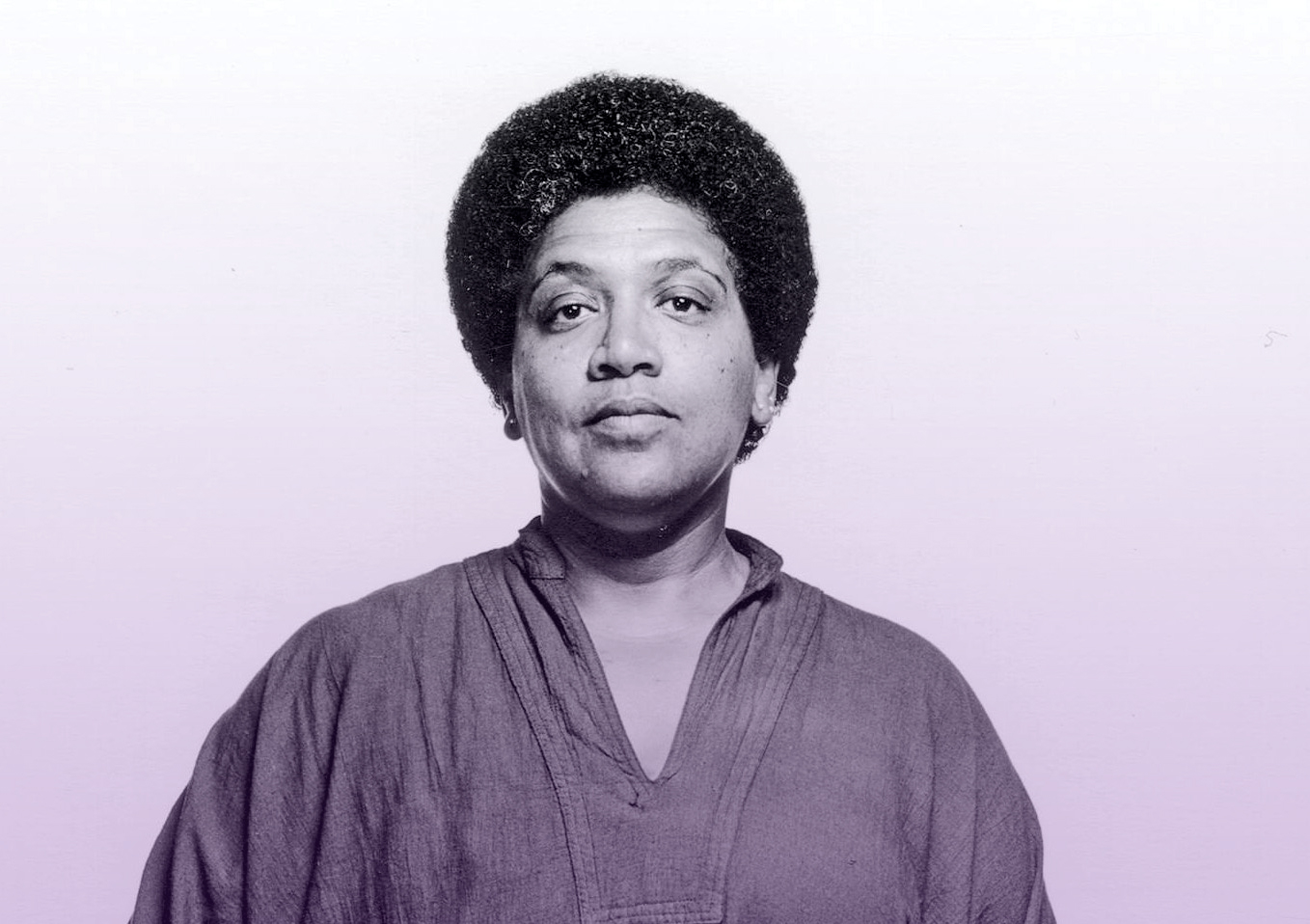 |
| Photo: Getty Images |
The difference between poetry and rhetoric
is being ready to kill
yourself
instead of your children.
I am trapped on a desert of raw gunshot wounds
and a dead child dragging his shattered black
face off the edge of my sleep
blood from his punctured cheeks and shoulders
is the only liquid for miles
and my stomach
churns at the imagined taste while
my mouth splits into dry lips
without loyalty or reason
thirsting for the wetness of his blood
as it sinks into the whiteness
of the desert where I am lost
without imagery or magic
trying to make power out of hatred and destruction
trying to heal my dying son with kisses
only the sun will bleach his bones quicker.
A policeman who shot down a ten year old in Queens
stood over the boy with his cop shoes in childish blood
and a voice said “Die you little motherfucker” and
there are tapes to prove it. At his trial
this policeman said in his own defense
“I didn't notice the size nor nothing else
only the color”. And
there are tapes to prove that, too.
Today that 37 year old white man
with 13 years of police forcing
was set free
by eleven white men who said they were satisfied
justice had been done
and one Black Woman who said
“They convinced me” meaning
they had dragged her 4'10'' black Woman's frame
over the hot coals
of four centuries of white male approval
until she let go
the first real power she ever had
and lined her own womb with cement
to make a graveyard for our children.
I have not been able to touch the destruction
within me.
But unless I learn to use
the difference between poetry and rhetoric
my power too will run corrupt as poisonous mold
or lie limp and useless as an unconnected wire
and one day I will take my teenaged plug
and connect it to the nearest socket
raping an 85 year old white woman
who is somebody's mother
and as I beat her senseless and set a torch to her bed
a greek chorus will be singing in 3/4 time
“Poor thing. She never hurt a soul. What beasts they are.”
The poem reflects the racial discrimination and segregation of African Americans at the hands of white supremacy. The poem starts with a contrast between rhetoric and poetry. The speaker says that poetry, with its metaphorical and imagistic power, is capable of speaking about the brutalities that are only discussed and forgotten. She expresses her fury and anger at a white police officer who shots a ten-year-old boy in Queens only because of his skin color, and there is evidence of this barbarity, too. Yet, despite having substantial pieces of evidence of his atrocious crime, the policeman is set free by the jury of eleven white men thinking the justice is served. Unfortunately, whites have been enjoying this supremacy for centuries.
Therefore, applying their unfair tactics, they have convinced the mother of the victim, robbing her real power as a junior. As the poet has witnessed all these tragedies on hand, she is unable to deal pain she feels for the victim. She adds, unless she learns from this traumatic experience, her own literary power will become corrupt to the extent that one day she will harm an elderly lady without considering future consequences. The poem ends with the confusion that the ‘woman’ is innocent and didn’t deserve to be hurt.
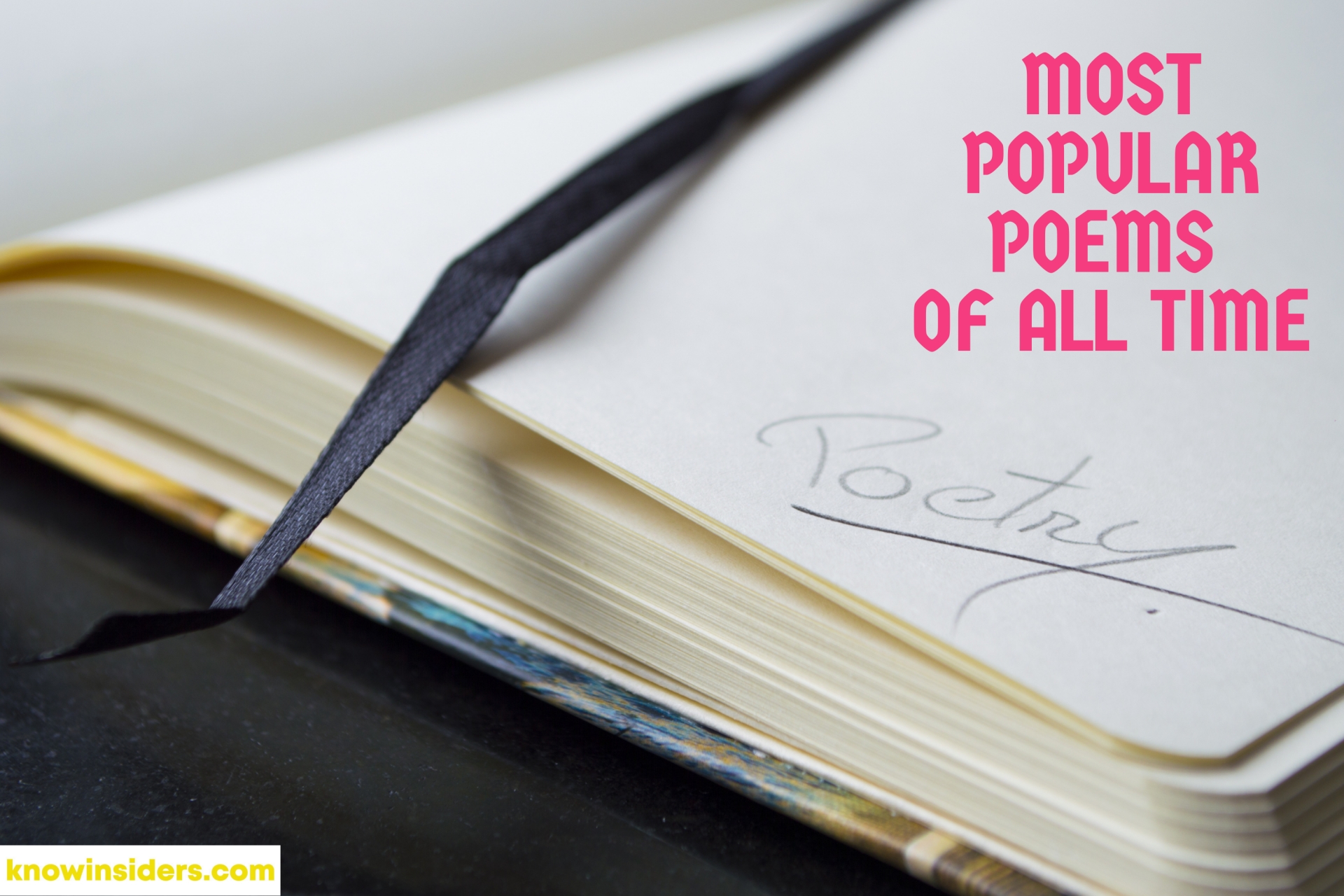 Top 20 Most Popular Poems (In English) Of All Time Top 20 Most Popular Poems (In English) Of All Time Robert Graves said “To be a poet is a condition, not a profession.” Great poets created great poems of all time. Check out The Top ... |
7. “i carry your heart with me” by e.e. cummings
i carry your heart with me(i carry it in
my heart)i am never without it(anywhere
i go you go,my dear;and whatever is done
by only me is your doing,my darling)
i fear
no fate(for you are my fate,my sweet)i want
no world(for beautiful you are my world,my true)
and it’s you are whatever a moon has always meant
and whatever a sun will always sing is you
here is the deepest secret nobody knows
(here is the root of the root and the bud of the bud
and the sky of the sky of a tree called life;which grows
higher than soul can hope or mind can hide)
and this is the wonder that's keeping the stars apart
i carry your heart(i carry it in my heart)
As a love poem, it shows the true nature of love. The poet expresses his deepest and intense emotions for his beloved. He says that wherever he goes he is accompanied by his beloved, and nothing can separate them. For him, his beloved is his whole universe. He can never imagine his life without her. He adds that his significant other is his source of living of which he is afraid of losing and carries her heart with him all the time. The depth of love between two people will gain the readers’ attention.
The major theme of the poem is love and its eternity. The spiritual bond and perfect union of the poet’s love is exemplary. The whole text discusses that his love is not only the source of satisfaction for him but also gives him strength, solace, and He compares his love with a tree, which goes beyond hopes, implying his love is immeasurable. He further says that his love is a mystery, which no one can resolve. To him, this pure love is the source of eternal peace, and he can never imagine his life without it.
6. “The Wasted Land” by T.S.Eliot
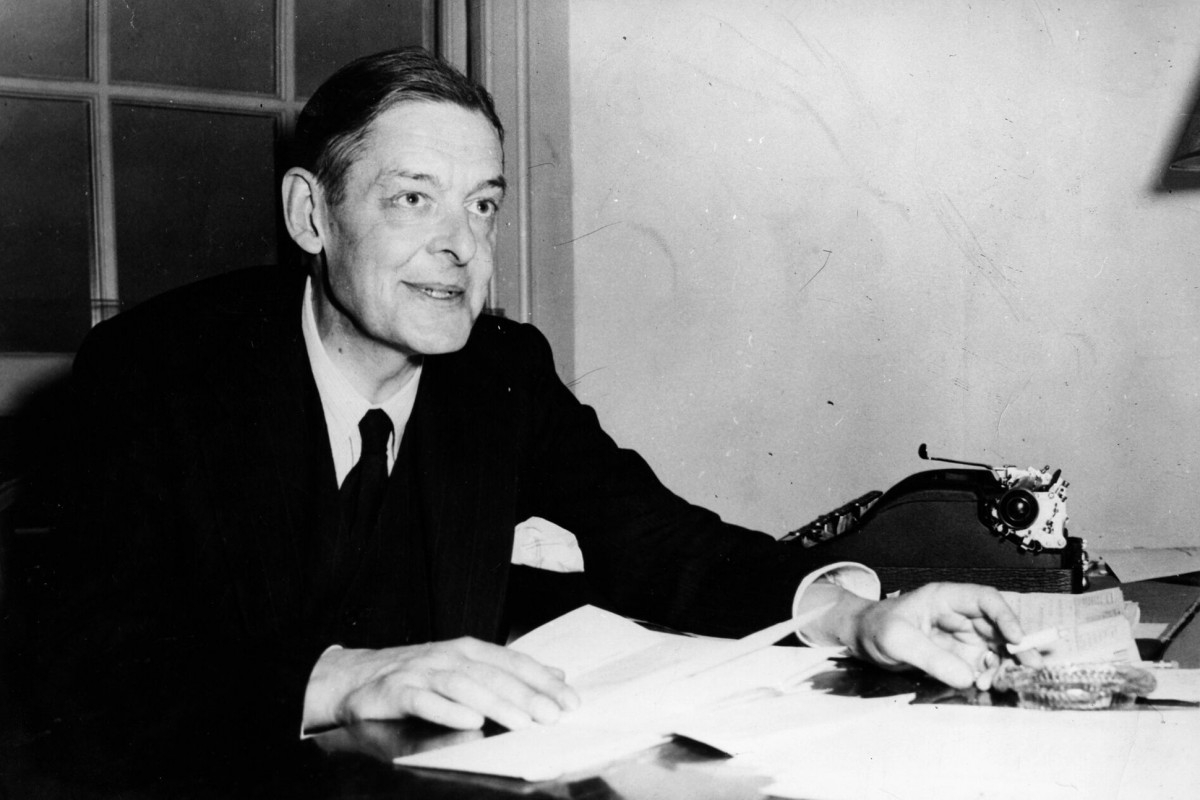 |
| Photo: Poetry Foundation |
I. The Burial of the Dead
April is the cruellest month, breeding
Lilacs out of the dead land, mixing
Memory and desire, stirring
Dull roots with spring rain.
Winter kept us warm, covering
Earth in forgetful snow, feeding
A little life with dried tubers.
Summer surprised us, coming over the Starnbergersee
With a shower of rain; we stopped in the colonnade,
And went on in sunlight, into the Hofgarten,
And drank coffee, and talked for an hour.
Bin gar keine Russin, stamm’ aus Litauen, echt deutsch.
And when we were children, staying at the arch-duke’s,
My cousin’s, he took me out on a sled,
And I was frightened. He said, Marie,
Marie, hold on tight. And down we went.
In the mountains, there you feel free.
I read, much of the night, and go south in the winter.
What are the roots that clutch, what branches grow
Out of this stony rubbish? Son of man,
You cannot say, or guess, for you know only
A heap of broken images, where the sun beats,
And the dead tree gives no shelter, the cricket no relief,
And the dry stone no sound of water. Only
There is shadow under this red rock,
(Come in under the shadow of this red rock),
And I will show you something different from either
Your shadow at morning striding behind you
Or your shadow at evening rising to meet you;
I will show you fear in a handful of dust.
Frisch weht der Wind
Der Heimat zu
Mein Irisch Kind,
Wo weilest du?
“You gave me hyacinths first a year ago;
“They called me the hyacinth girl.”
—Yet when we came back, late, from the Hyacinth garden,
Your arms full, and your hair wet, I could not
Speak, and my eyes failed, I was neither
Living nor dead, and I knew nothing,
Looking into the heart of light, the silence.
Oed’ und leer das Meer.
Madame Sosostris, famous clairvoyante,
Had a bad cold, nevertheless
Is known to be the wisest woman in Europe,
With a wicked pack of cards. Here, said she,
Is your card, the drowned Phoenician Sailor,
(Those are pearls that were his eyes. Look!)
Here is Belladonna, the Lady of the Rocks,
The lady of situations.
Here is the man with three staves, and here the Wheel,
And here is the one-eyed merchant, and this card,
Which is blank, is something he carries on his back,
Which I am forbidden to see. I do not find
The Hanged Man. Fear death by water.
I see crowds of people, walking round in a ring.
Thank you. If you see dear Mrs. Equitone,
Tell her I bring the horoscope myself:
One must be so careful these days.
Unreal City,
Under the brown fog of a winter dawn,
A crowd flowed over London Bridge, so many,
I had not thought death had undone so many.
Sighs, short and infrequent, were exhaled,
And each man fixed his eyes before his feet.
Flowed up the hill and down King William Street,
To where Saint Mary Woolnoth kept the hours
With a dead sound on the final stroke of nine.
There I saw one I knew, and stopped him, crying: “Stetson!
“You who were with me in the ships at Mylae!
“That corpse you planted last year in your garden,
“Has it begun to sprout? Will it bloom this year?
“Or has the sudden frost disturbed its bed?
“Oh keep the Dog far hence, that’s friend to men,
“Or with his nails he’ll dig it up again!
“You! hypocrite lecteur!—mon semblable,—mon frère!”
II. A Game of Chess
The Chair she sat in, like a burnished throne,
Glowed on the marble, where the glass
Held up by standards wrought with fruited vines
From which a golden Cupidon peeped out
(Another hid his eyes behind his wing)
Doubled the flames of sevenbranched candelabra
Reflecting light upon the table as
The glitter of her jewels rose to meet it,
From satin cases poured in rich profusion;
In vials of ivory and coloured glass
Unstoppered, lurked her strange synthetic perfumes,
Unguent, powdered, or liquid—troubled, confused
And drowned the sense in odours; stirred by the air
That freshened from the window, these ascended
In fattening the prolonged candle-flames,
Flung their smoke into the laquearia,
Stirring the pattern on the coffered ceiling.
Huge sea-wood fed with copper
Burned green and orange, framed by the coloured stone,
In which sad light a carvéd dolphin swam.
Above the antique mantel was displayed
As though a window gave upon the sylvan scene
The change of Philomel, by the barbarous king
So rudely forced; yet there the nightingale
Filled all the desert with inviolable voice
And still she cried, and still the world pursues,
“Jug Jug” to dirty ears.
And other withered stumps of time
Were told upon the walls; staring forms
Leaned out, leaning, hushing the room enclosed.
Footsteps shuffled on the stair.
Under the firelight, under the brush, her hair
Spread out in fiery points
Glowed into words, then would be savagely still.
“My nerves are bad tonight. Yes, bad. Stay with me.
“Speak to me. Why do you never speak. Speak.
“What are you thinking of? What thinking? What?
“I never know what you are thinking. Think.”
I think we are in rats’ alley
Where the dead men lost their bones.
“What is that noise?”
The wind under the door.
“What is that noise now? What is the wind doing?”
Nothing again nothing.
“Do
“You know nothing? Do you see nothing? Do you remember
“Nothing?”
I remember
Those are pearls that were his eyes.
“Are you alive, or not? Is there nothing in your head?”
But
O O O O that Shakespeherian Rag—
It’s so elegant
So intelligent
“What shall I do now? What shall I do?”
“I shall rush out as I am, and walk the street
“With my hair down, so. What shall we do tomorrow?
“What shall we ever do?”
The hot water at ten.
And if it rains, a closed car at four.
And we shall play a game of chess,
Pressing lidless eyes and waiting for a knock upon the door.
When Lil’s husband got demobbed, I said—
I didn’t mince my words, I said to her myself,
HURRY UP PLEASE ITS TIME
Now Albert’s coming back, make yourself a bit smart.
He’ll want to know what you done with that money he gave you
To get yourself some teeth. He did, I was there.
You have them all out, Lil, and get a nice set,
He said, I swear, I can’t bear to look at you.
And no more can’t I, I said, and think of poor Albert,
He’s been in the army four years, he wants a good time,
And if you don’t give it him, there’s others will, I said.
Oh is there, she said. Something o’ that, I said.
Then I’ll know who to thank, she said, and give me a straight look.
HURRY UP PLEASE ITS TIME
If you don’t like it you can get on with it, I said.
Others can pick and choose if you can’t.
But if Albert makes off, it won’t be for lack of telling.
You ought to be ashamed, I said, to look so antique.
(And her only thirty-one.)
I can’t help it, she said, pulling a long face,
It’s them pills I took, to bring it off, she said.
(She’s had five already, and nearly died of young George.)
The chemist said it would be all right, but I’ve never been the same.
You are a proper fool, I said.
Well, if Albert won’t leave you alone, there it is, I said,
What you get married for if you don’t want children?
HURRY UP PLEASE ITS TIME
Well, that Sunday Albert was home, they had a hot gammon,
And they asked me in to dinner, to get the beauty of it hot—
HURRY UP PLEASE ITS TIME
HURRY UP PLEASE ITS TIME
Goonight Bill. Goonight Lou. Goonight May. Goonight.
Ta ta. Goonight. Goonight.
Good night, ladies, good night, sweet ladies, good night, good night.
III. The Fire Sermon
The river’s tent is broken: the last fingers of leaf
Clutch and sink into the wet bank. The wind
Crosses the brown land, unheard. The nymphs are departed.
Sweet Thames, run softly, till I end my song.
The river bears no empty bottles, sandwich papers,
Silk handkerchiefs, cardboard boxes, cigarette ends
Or other testimony of summer nights. The nymphs are departed.
And their friends, the loitering heirs of city directors;
Departed, have left no addresses.
By the waters of Leman I sat down and wept . . .
Sweet Thames, run softly till I end my song,
Sweet Thames, run softly, for I speak not loud or long.
But at my back in a cold blast I hear
The rattle of the bones, and chuckle spread from ear to ear.
A rat crept softly through the vegetation
Dragging its slimy belly on the bank
While I was fishing in the dull canal
On a winter evening round behind the gashouse
Musing upon the king my brother’s wreck
And on the king my father’s death before him.
White bodies naked on the low damp ground
And bones cast in a little low dry garret,
Rattled by the rat’s foot only, year to year.
But at my back from time to time I hear
The sound of horns and motors, which shall bring
Sweeney to Mrs. Porter in the spring.
O the moon shone bright on Mrs. Porter
And on her daughter
They wash their feet in soda water
Et O ces voix d’enfants, chantant dans la coupole!
Twit twit twit
Jug jug jug jug jug jug
So rudely forc’d.
Tereu
Unreal City
Under the brown fog of a winter noon
Mr. Eugenides, the Smyrna merchant
Unshaven, with a pocket full of currants
C.i.f. London: documents at sight,
Asked me in demotic French
To luncheon at the Cannon Street Hotel
Followed by a weekend at the Metropole.
At the violet hour, when the eyes and back
Turn upward from the desk, when the human engine waits
Like a taxi throbbing waiting,
I Tiresias, though blind, throbbing between two lives,
Old man with wrinkled female breasts, can see
At the violet hour, the evening hour that strives
Homeward, and brings the sailor home from sea,
The typist home at teatime, clears her breakfast, lights
Her stove, and lays out food in tins.
Out of the window perilously spread
Her drying combinations touched by the sun’s last rays,
On the divan are piled (at night her bed)
Stockings, slippers, camisoles, and stays.
I Tiresias, old man with wrinkled dugs
Perceived the scene, and foretold the rest—
I too awaited the expected guest.
He, the young man carbuncular, arrives,
A small house agent’s clerk, with one bold stare,
One of the low on whom assurance sits
As a silk hat on a Bradford millionaire.
The time is now propitious, as he guesses,
The meal is ended, she is bored and tired,
Endeavours to engage her in caresses
Which still are unreproved, if undesired.
Flushed and decided, he assaults at once;
Exploring hands encounter no defence;
His vanity requires no response,
And makes a welcome of indifference.
(And I Tiresias have foresuffered all
Enacted on this same divan or bed;
I who have sat by Thebes below the wall
And walked among the lowest of the dead.)
Bestows one final patronising kiss,
And gropes his way, finding the stairs unlit . . .
She turns and looks a moment in the glass,
Hardly aware of her departed lover;
Her brain allows one half-formed thought to pass:
“Well now that’s done: and I’m glad it’s over.”
When lovely woman stoops to folly and
Paces about her room again, alone,
She smoothes her hair with automatic hand,
And puts a record on the gramophone.
“This music crept by me upon the waters”
And along the Strand, up Queen Victoria Street.
O City city, I can sometimes hear
Beside a public bar in Lower Thames Street,
The pleasant whining of a mandoline
And a clatter and a chatter from within
Where fishmen lounge at noon: where the walls
Of Magnus Martyr hold
Inexplicable splendour of Ionian white and gold.
The river sweats
Oil and tar
The barges drift
With the turning tide
Red sails
Wide
To leeward, swing on the heavy spar.
The barges wash
Drifting logs
Down Greenwich reach
Past the Isle of Dogs.
Weialala leia
Wallala leialala
Elizabeth and Leicester
Beating oars
The stern was formed
A gilded shell
Red and gold
The brisk swell
Rippled both shores
Southwest wind
Carried down stream
The peal of bells
White towers
Weialala leia
Wallala leialala
“Trams and dusty trees.
Highbury bore me. Richmond and Kew
Undid me. By Richmond I raised my knees
Supine on the floor of a narrow canoe.”
“My feet are at Moorgate, and my heart
Under my feet. After the event
He wept. He promised a ‘new start.’
I made no comment. What should I resent?”
“On Margate Sands.
I can connect
Nothing with nothing.
The broken fingernails of dirty hands.
My people humble people who expect
Nothing.”
la la
To Carthage then I came
Burning burning burning burning
O Lord Thou pluckest me out
O Lord Thou pluckest
burning
IV. Death by Water
Phlebas the Phoenician, a fortnight dead,
Forgot the cry of gulls, and the deep sea swell
And the profit and loss.
A current under sea
Picked his bones in whispers. As he rose and fell
He passed the stages of his age and youth
Entering the whirlpool.
Gentile or Jew
O you who turn the wheel and look to windward,
Consider Phlebas, who was once handsome and tall as you.
V. What the Thunder Said
After the torchlight red on sweaty faces
After the frosty silence in the gardens
After the agony in stony places
The shouting and the crying
Prison and palace and reverberation
Of thunder of spring over distant mountains
He who was living is now dead
We who were living are now dying
With a little patience
Here is no water but only rock
Rock and no water and the sandy road
The road winding above among the mountains
Which are mountains of rock without water
If there were water we should stop and drink
Amongst the rock one cannot stop or think
Sweat is dry and feet are in the sand
If there were only water amongst the rock
Dead mountain mouth of carious teeth that cannot spit
Here one can neither stand nor lie nor sit
There is not even silence in the mountains
But dry sterile thunder without rain
There is not even solitude in the mountains
But red sullen faces sneer and snarl
From doors of mudcracked houses
If there were water
And no rock
If there were rock
And also water
And water
A spring
A pool among the rock
If there were the sound of water only
Not the cicada
And dry grass singing
But sound of water over a rock
Where the hermit-thrush sings in the pine trees
Drip drop drip drop drop drop drop
But there is no water
Who is the third who walks always beside you?
When I count, there are only you and I together
But when I look ahead up the white road
There is always another one walking beside you
Gliding wrapt in a brown mantle, hooded
I do not know whether a man or a woman
—But who is that on the other side of you?
What is that sound high in the air
Murmur of maternal lamentation
Who are those hooded hordes swarming
Over endless plains, stumbling in cracked earth
Ringed by the flat horizon only
What is the city over the mountains
Cracks and reforms and bursts in the violet air
Falling towers
Jerusalem Athens Alexandria
Vienna London
Unreal
A woman drew her long black hair out tight
And fiddled whisper music on those strings
And bats with baby faces in the violet light
Whistled, and beat their wings
And crawled head downward down a blackened wall
And upside down in air were towers
Tolling reminiscent bells, that kept the hours
And voices singing out of empty cisterns and exhausted wells.
In this decayed hole among the mountains
In the faint moonlight, the grass is singing
Over the tumbled graves, about the chapel
There is the empty chapel, only the wind’s home.
It has no windows, and the door swings,
Dry bones can harm no one.
Only a cock stood on the rooftree
Co co rico co co rico
In a flash of lightning. Then a damp gust
Bringing rain
Ganga was sunken, and the limp leaves
Waited for rain, while the black clouds
Gathered far distant, over Himavant.
The jungle crouched, humped in silence.
Then spoke the thunder
DA
Datta: what have we given?
My friend, blood shaking my heart
The awful daring of a moment’s surrender
Which an age of prudence can never retract
By this, and this only, we have existed
Which is not to be found in our obituaries
Or in memories draped by the beneficent spider
Or under seals broken by the lean solicitor
In our empty rooms
DA
Dayadhvam: I have heard the key
Turn in the door once and turn once only
We think of the key, each in his prison
Thinking of the key, each confirms a prison
Only at nightfall, aethereal rumours
Revive for a moment a broken Coriolanus
DA
Damyata: The boat responded
Gaily, to the hand expert with sail and oar
The sea was calm, your heart would have responded
Gaily, when invited, beating obedient
To controlling hands
I sat upon the shore
Fishing, with the arid plain behind me
Shall I at least set my lands in order?
London Bridge is falling down falling down falling down
Poi s’ascose nel foco che gli affina
Quando fiam uti chelidon—O swallow swallow
Le Prince d’Aquitaine à la tour abolie
These fragments I have shored against my ruins
Why then Ile fit you. Hieronymo’s mad againe.
Datta. Dayadhvam. Damyata.
Shantih shantih shantih
The Waste Land can be viewed as a poem about brokenness and loss, and Eliot’s numerous allusions to the First World War suggest that the war played a significant part in bringing about this social, psychological, and emotional collapse. (Perhaps revealingly, Eliot completed the poem while recovering from a nervous breakdown.) Many of the characters who turn up in Eliot’s poem – such as Lil, the mother-of-five whose unhappy marriage is discussed by her friend in a London pub – lead unfulfilling lives and their relationships are lacking in intimacy and deeper meaning.
People’s lives in general are lacking spiritual significance. The typist in ‘The Fire Sermon’ is a good example of this: her job involves merely copying or repeating what others have said, and when she gets home from work her food is processed and comes in tins, and even her sex life is mechanical and repetitive, something Eliot neatly captures with his use of regular quatrains at this point in the poem. The music she listens to when her lover has gone is played on a gramophone: it’s a world away from the magical music Ferdinand heard on the enchanted island in Shakespeare’s The Tempest. Modern life has lost all sense of magic and meaning.
The cure for this spiritual sickness which plagues the king and his land is the Holy Grail, but only those who are pure of heart will find the Grail (the cup that, according to Christian legend, caught Jesus’ blood at the Crucifixion). Is anyone in the modern world of The Waste Land up to such a task? The poem’s references to the Buddhist Fire Sermon suggest that before we will become worthy of salvation, we must first learn to curb our worldly desires and passions in order to attain spiritual enlightenment.
The Waste Land begins with a reference to a ‘heap of broken images’ and ends with a collage of quotations taken from various poetic traditions, as well as a snippet from the nursery rhyme ‘London Bridge is falling down’. Art, literature, oral and written culture – civilisation itself – seem to be under threat. Can we do anything other than shore up the ruins? The poem ends on an ambiguous note, with the triple repetition of the Sanskrit word ‘Shantih’, which Eliot translates as ‘the peace which passeth understanding’. Has such peace finally been achieved, or is this merely wishful thinking? The breakdown of the poem into a confused medley of semi-coherent quotations implies that after the war, such peace remains a far-off dream.
5. “The Red Wheelbarrow” by William Carlos Williams
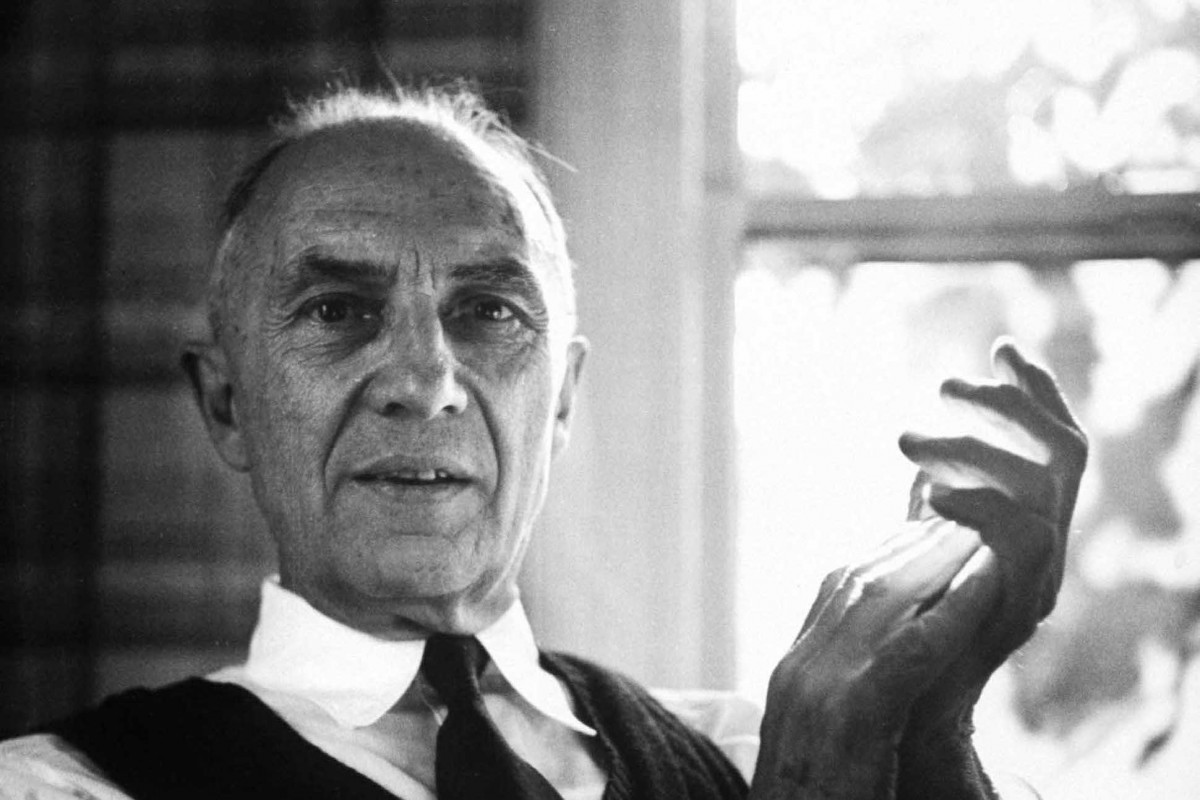 |
| Photo: Poetry Foundation |
so much depends
upon
a red wheel
barrow
glazed with rain
water
beside the white
chickens
Williams’ poem turns on enjambment, which is utilised in every one of its four short stanzas. The first stanza even highlights how the syntax of the run-on line reflects the meaning being conveyed: we read ‘So much depends / upon’ and depend upon the continuation of the poem into the second line to provide us with the rest of the meaning. ‘Depends’ leaves us suspended, dependent. Similarly, ‘a red wheel’ finds itself transformed by the next line: not a red wheel, we realise, but red wheel barrow; not merely glazed with rain but with rain water. This latter example doesn’t alter the poem’s semantic sense – rainwater is, after all, rain – but the effect of thinking we have the full story, only to have the extra ‘water’ appear in the following line, enacts the slow dripping of the rainwater droplets from the barrow onto the ground, or, indeed, William Carlos Williams Red Wheelbarrowthe slow recognition of the water droplets on the wheelbarrow. By that fourth and final stanza, we have grown wise to this technique, and we know that ‘beside the white’ remains unfinished, with the noun being required to complement the adjective ‘white’.
However, another way to interpret the meaning of ‘The Red Wheelbarrow’ is to affirm that Williams literally means that much depends upon a red wheelbarrow and the white chickens: that these symbols of farming and agriculture are central to the maintaining of life as we know it. Of course, one may ask here why it’s important the wheelbarrow is red; would a green wheelbarrow be viewed as less important in the agrarian history of the world? But this interpretation is tenable, nevertheless.
Yet although ‘The Red Wheelbarrow’ is unrhymed, the subtle interplay between the sounds of the words that end each line creates a melodious pattern that reminds us of rhyme: ‘chickens’ very faintly picks up on ‘depends’ from the beginning of the poem, while it is possible to detect a faint alliterative relationship between ‘water’ and ‘white’. In the last analysis, William Carlos Williams clearly set out to write a poem that offers concreteness of expression as its main feature. And, of course, that red wheelbarrow.
4. “Ozymandias” by Percy Bysshe Shelley
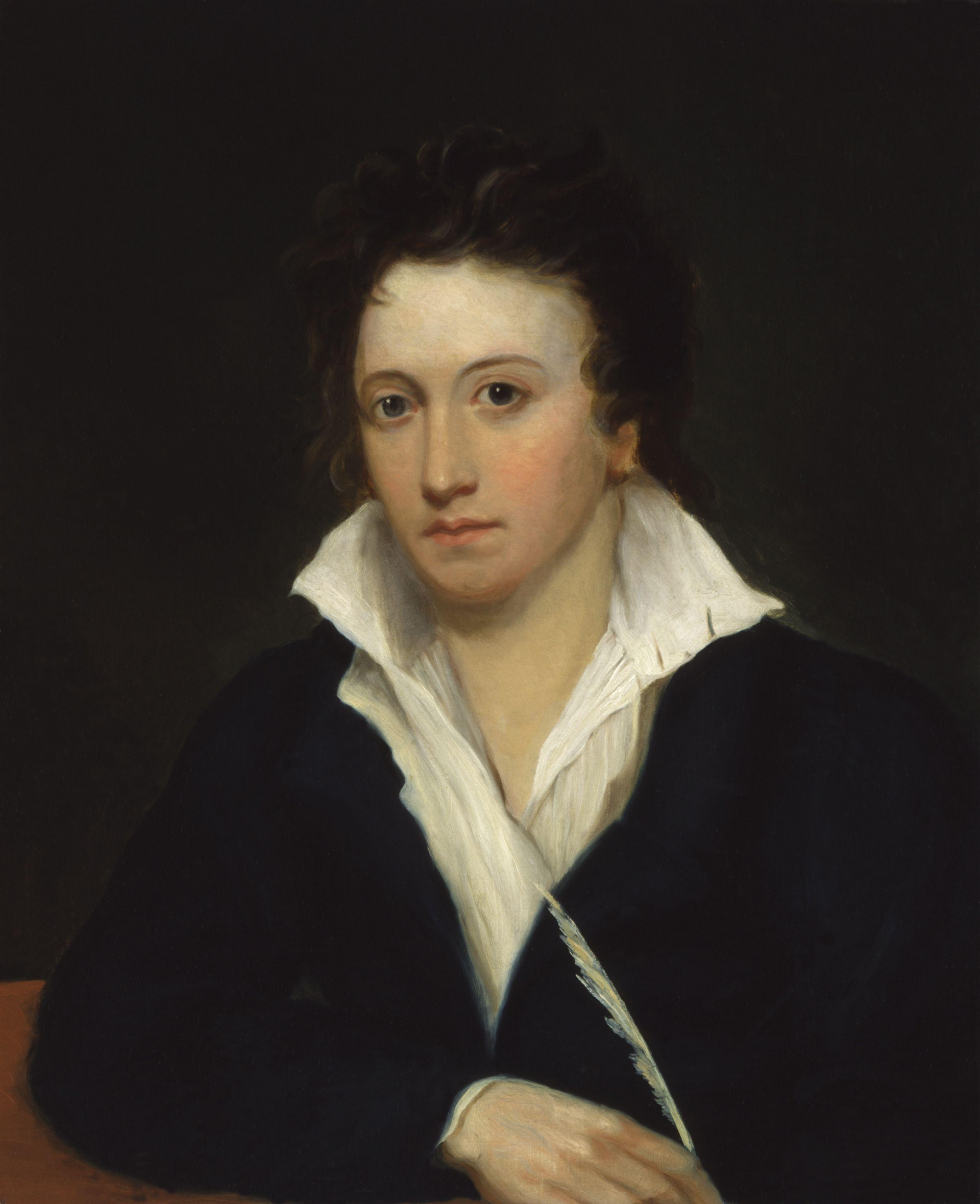 |
| Photo: Wikipedia |
I met a traveller from an antique land,
Who said—“Two vast and trunkless legs of stone
Stand in the desert. . . . Near them, on the sand,
Half sunk a shattered visage lies, whose frown,
And wrinkled lip, and sneer of cold command,
Tell that its sculptor well those passions read
Which yet survive, stamped on these lifeless things,
The hand that mocked them, and the heart that fed;
And on the pedestal, these words appear:
My name is Ozymandias, King of Kings;
Look on my Works, ye Mighty, and despair!
Nothing beside remains. Round the decay
Of that colossal Wreck, boundless and bare
The lone and level sands stretch far away.”
The mention of a traveler is a promise of a story. The story is a characteristically Shelleyan one about tyranny and how time makes a mockery of the boastfulness of even the most powerful kings. The story is over and Shelley's point is made before the reader realizes that he has been subjected to a moral lesson.
The fine beginning is followed by a condensed and vigorous account of what the traveler saw in addition to the two huge legs standing in the desert: a shattered visage, a pedestal, and on it a boastful inscription. Nothing more except the empty desert. Shelley puts the words of the inscription in effectively ironic contrast with the surroundings. The rulers of the world, "ye Mighty," are told by Ozymandias, "king of kings," to look upon his works and despair of emulating them. Now one looks and sees nothing whatsoever. Instead of the architectural marvels promised by the inscription, "the lone and level sands stretch far away." Just as the sculptor mocked Ozymandias by putting on the face of the colossal monument a "frown / And wrinkled lip, and sneer of cold command," so time has also mocked him by reducing his vain boast to nothingness. The works that were to be the despair of other pharaohs have completely disappeared. Even the gigantic statue of himself that he had commissioned has been reduced to two legs, a shattered face, and a pedestal.
"Ozymandias" was written by Shelley in competition with his friend Horace Smith. The superiority of Shelley's choice of details and of the vigor of his diction are splendidly illustrated by a comparison with the octave of his friend's sonnet.
Ozymandias was the name by which Ramses II, a pharaoh famous for the number of architectural structures he caused to be erected, was known to the Greeks. Shelley had read of the statue in Diodorus Siculus, a Roman writer, who had described it as intact. He had obviously read about it in some other source also since he knew that the statue was no longer intact. The problem of Shelley's sources is discussed in an interesting, illustrated article by Johnstone Parr, "Shelley's 'Ozymandias,'" Keats-Shelley Journal Vol. VI (1957).
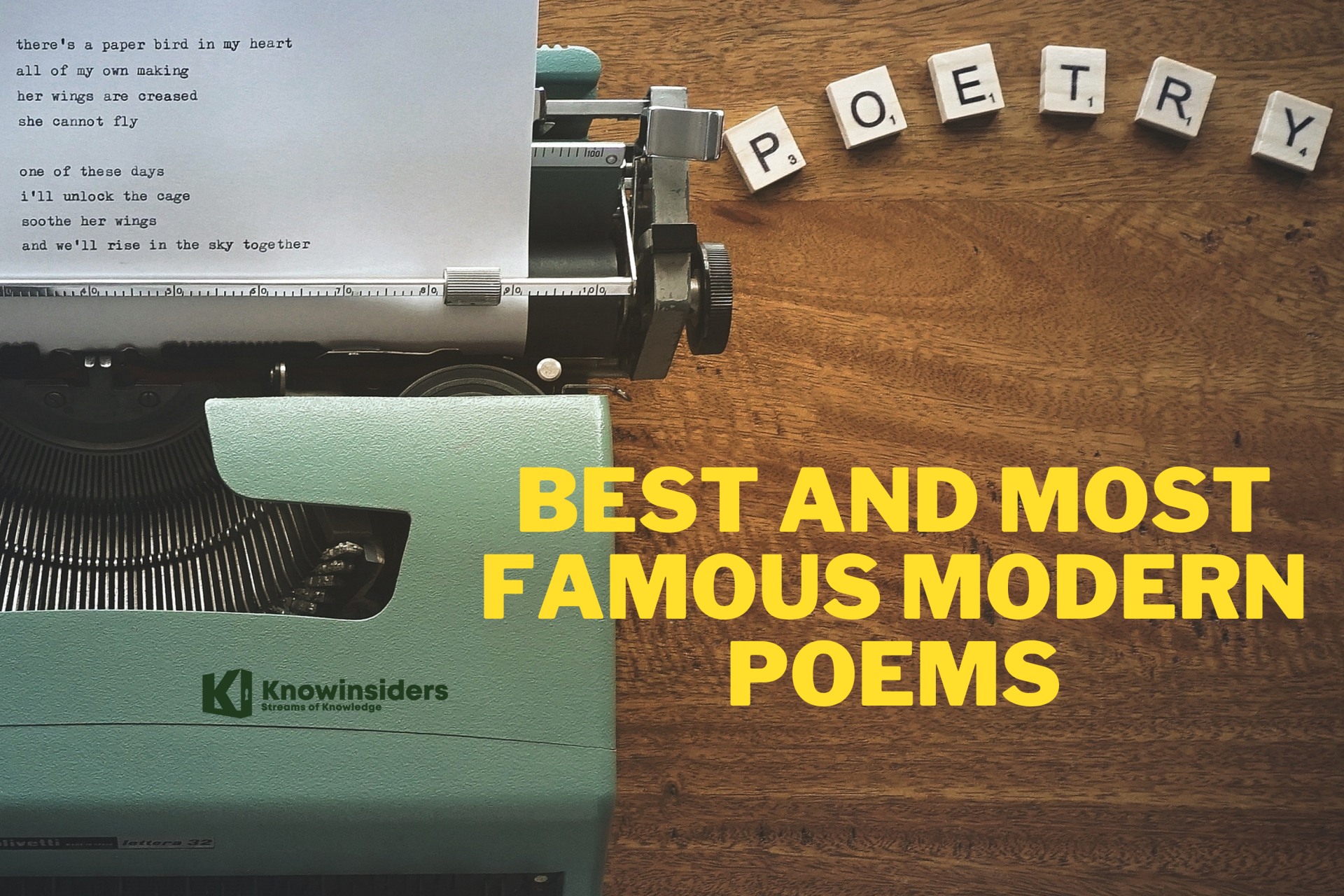 Top 10 Best And Most Famous Modern Poems Top 10 Best And Most Famous Modern Poems What are the best and most famous modern poems? Let's find out in the list below! |
3. “Daffodils” by William Wordsworth
I wandered lonely as a cloud
That floats on high o'er vales and hills,
When all at once I saw a crowd,
A host, of golden daffodils;
Beside the lake, beneath the trees,
Fluttering and dancing in the breeze.
Continuous as the stars that shine
And twinkle on the milky way,
They stretched in never-ending line
Along the margin of a bay:
Ten thousand saw I at a glance,
Tossing their heads in sprightly dance.
The waves beside them danced; but they
Out-did the sparkling waves in glee:
A poet could not but be gay,
In such a jocund company:
I gazed—and gazed—but little thought
What wealth the show to me had brought:
For oft, when on my couch I lie
In vacant or in pensive mood,
They flash upon that inward eye
Which is the bliss of solitude;
And then my heart with pleasure fills,
And dances with the daffodils.
William Wordsworth wrote Daffodils on a stormy day in spring, while walking along with his sister Dorothy near Ullswater Lake, in England. He imagined that the daffodils were dancing and invoking him to join and enjoy the breezy nature of the fields. Dorothy Wordsworth, the younger sister of William Wordsworth, found the poem so interesting that she took ‘Daffodils’ as the subject for her journal. The poem is written as an appreciation of daffodils, and contains six lines in four stanzas.
In the first stanza, the writer finds himself as a lonely cloud floating over the valley. The author describes himself ‘lonely’ because his brother John was dead, leaving him alone and sad. Then he encountered the yellow daffodils beside the lake. The flowers were swaying here and there due to the heavy breeze, as if they were dancing happily.
Second stanza is about how amazing the daffodils looked in the spring season. The author found those flowers like stars which shined and twinkled in the night sky. They were nodding their heads while dancing. Then Wordsworth expressed that these beautiful flowers stood in a never-ending line. He felt an illusion that he is watching all ten thousand of flowers altogether in a glance.
Third stanza is the continuation of how along with the flowers, the water in the lake too moved, as if they were competing with each other in the dance. But the glee flowers won and the sparkling lake lost. Finding their playfulness, the author couldn’t stop himself from joining their company. The author kept staring at both of them, wondering how his sad mood changed into a happy one. The daffodils and lake’s dance bought him a wealth that he couldn’t deny. The mesmerizing flowers gained a place in his heart he couldn’t understand but felt.
The last or the fourth stanza is narration of what pleasure the author had gained after watching the daffodils dancing that day. Whenever the author, Wordsworth felt sad or alone, the picture of dancing daffodils came to his mind and it was like he regained life’s treasure. How valuable the solitude is! At the end, author’s heart was content in joining the daffodils’ dance.
2. “Holy Sonnet 10: Death, Be Not Proud” by John Donne
Death, be not proud, though some have called thee
Mighty and dreadful, for thou art not so;
For those, whom thou think'st thou dost overthrow,
Die not, poor Death, nor yet canst thou kill me.
From rest and sleep, which but thy picture[s] be,
Much pleasure, then from thee much more must flow,
And soonest our best men with thee do go,
Rest of their bones, and soul's delivery.
Thou'rt slave to Fate, chance, kings, and desperate men,
And dost with poison, war, and sickness dwell,
And poppy, or charms can make us sleep as well,
And better than thy stroke; why swell'st thou then?
One short sleep past, we wake eternally,
And Death shall be no more, Death, thou shalt die.
The death is personified and the speaker brings forth an argument; the argument is that Death is not all powerful as we are forced to think. Finally, Death gives us the way to the eternal life, a kind of freedom from this worldly sorrow. Death is just a sound sleep from which we will awake at the Day of Judgment. From that day, there will not be death. On that very day, Death dies. So, there is no reasoning in fearing of Death and Death too does not have any logical reason to be proud of.
The speaker proves that the Death is only connected to the negative and destructive forces of the life such as, poison, battle, sickness, accidents et cetera. Opium and other drugs can bring sound sleep better than the Death. Because of the servile nature of the Death and its connection with the evil events of the life of a human being, Death should not be proud. Death itself has finality and end on the Day of Judgment, but human beings have life after death which is eternal.
Donne applies his characteristic metaphysical wit in the choice of structure, poetic techniques, language, irony, and paradox. This Sonnet follows Shakespearean form of three quatrains and a concluding line, but the rhyming pattern is that of Petrarchan: abba for the first two quatrains, forming an octet. The assured tone of the speaker in Death, be not Proud, and the straight verbal clash to the Death delivers an ironic sense of security to the readers by indirectly suggesting that Death is not to be feared at all, and it too has to face the end by the greater force in the Day of Judgment.
1. “Sonnet 18” by William Shakespeare
Shall I compare thee to a summer’s day?
Thou art more lovely and more temperate:
Rough winds do shake the darling buds of May,
And summer’s lease hath all too short a date;
Sometime too hot the eye of heaven shines,
And often is his gold complexion dimm'd;
And every fair from fair sometime declines,
By chance or nature’s changing course untrimm'd;
But thy eternal summer shall not fade,
Nor lose possession of that fair thou ow’st;
Nor shall death brag thou wander’st in his shade,
When in eternal lines to time thou grow’st:
So long as men can breathe or eyes can see,
So long lives this, and this gives life to thee.
The poem starts with a rhetorical question that emphasizes the worth of the beloved’s beauty. This question plays the role of informing the reader about the ensuing comparison in the rest of the poem. The speaker talks to his beloved as if his beloved is standing in front of him. This conversational style makes the message of the poem easy to grasp. It also makes it very attractive for the readers.
The next line continues the same comparison. The speaker describes how his beloved is more temperate than summer by describing the roughness of summer. He says that the strong winds in summer shake the newly-sprouted buds on trees. Here, the epithet “darling” is used with the word “buds” to maintain the atmosphere of romance and flattery in the poem.
The last line of the quatrain describes another flaw of the summer season. The speaker says that the summer season is short-lived and is destined to fade into the clutches of the cruel autumn. He uses the phrase “all too short a date” to describe the shortness of the summer season. The use of two quantifiers before the word short emphasizes the speaker’s claim.
The next quatrain brings a few more flaws in the summer season. The speaker is weary of the two extremes of sunshine during the summer season. He uses the metaphor “the eye of heaven” to describe the sun. This use of metaphor is intended to further elevate the status of the speaker’s beloved by showing that he is even better than heavenly entities. The speaker says that the sun shines too brightly at times during the summer season. It makes the pleasant weather a bit too hot to bear.
Similarly, the speaker claims, sometimes the sunshine is too dull, and the weather becomes cold. Here, the speaker uses the metaphor “his gold complexion” to refer to sunshine. This metaphor creates the image of a beautiful person with golden complexion being compared with the golden rays of the sun in the minds of the readers.
The remaining two lines of the quatrain address the problem of mortality. The speaker says that every beautiful thing is doomed to lose its beauty at some point in time. It can happen to a person or a thing through a stroke of luck. The person or thing might face an accident that will take away all its beauty. Moreover, the inevitable death is also waiting for every entity and will prove to be the ultimate end of every type of beauty.
In the third quatrain, the speaker tells his beloved that he should not be afraid of these things. He uses the phrase “thy eternal summer” to refer to his beloved’s beauty. This metaphor serves the purpose of maintaining the image of the comparison of the summer season and the speaker’s beloved, which started in the first line. The second line continues the same thought, and the speaker tells his beloved that he should not be afraid of losing his charm. His charm will stay eternally.
In the third line of the quatrain, the speaker makes another promise with his beloved. He tells him that he should not be afraid of death. Here, death is personified and is given the human quality of bragging. The personified image of death creates the image of a boastful enemy, which is trying to bring everything under its shadows. In this way, it is portrayed as a true antagonist. The speaker tells his beloved that this antagonist will never be able to cast his shadow over him.
In the last line of the quatrain, the speaker reassures his beloved that he will go on to grow in the lines created by him. These lines will go on parallel with time and will never face death.
The last two lines of the sonnet make a couplet where the speaker talks of his arsenal in his fight against mortality and death. He says that as long as human life exists on this earth, his lines will be read. He uses the phrase “men can breathe, or eyes can see” to refer to human life on earth. Such an elaborated reference emphasizes that even when a single aspect of human life is here on earth, the speaker’s words will live. He furthers his claim by saying that the immortality of his poetry will give immortality to his beloved.
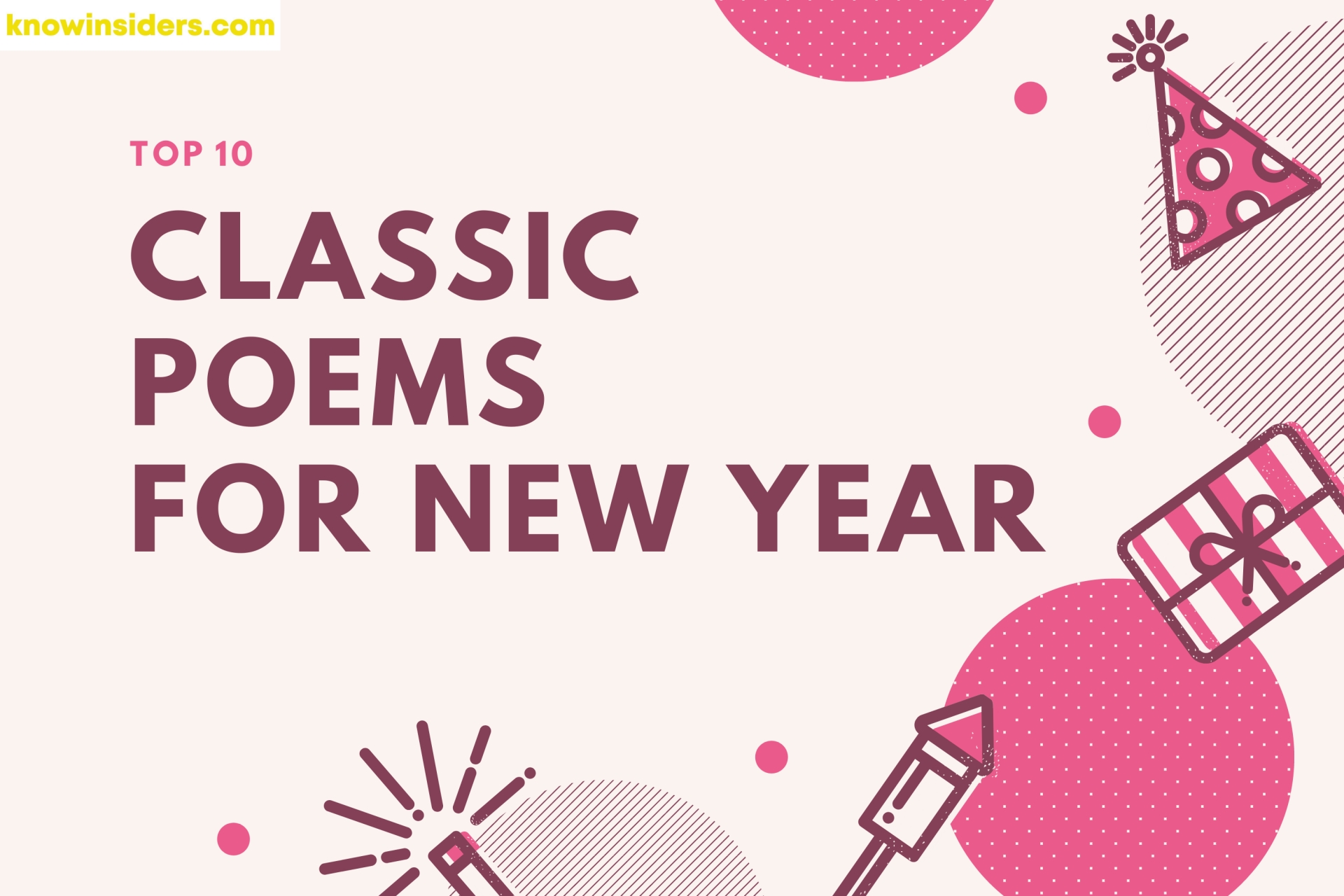 Top 10 Best Classic Poems For New Year Top 10 Best Classic Poems For New Year Have you ever tried reading classic poems on New Year holiday? Let’s explore Top 10 Famous Classic Poems For New Year. |
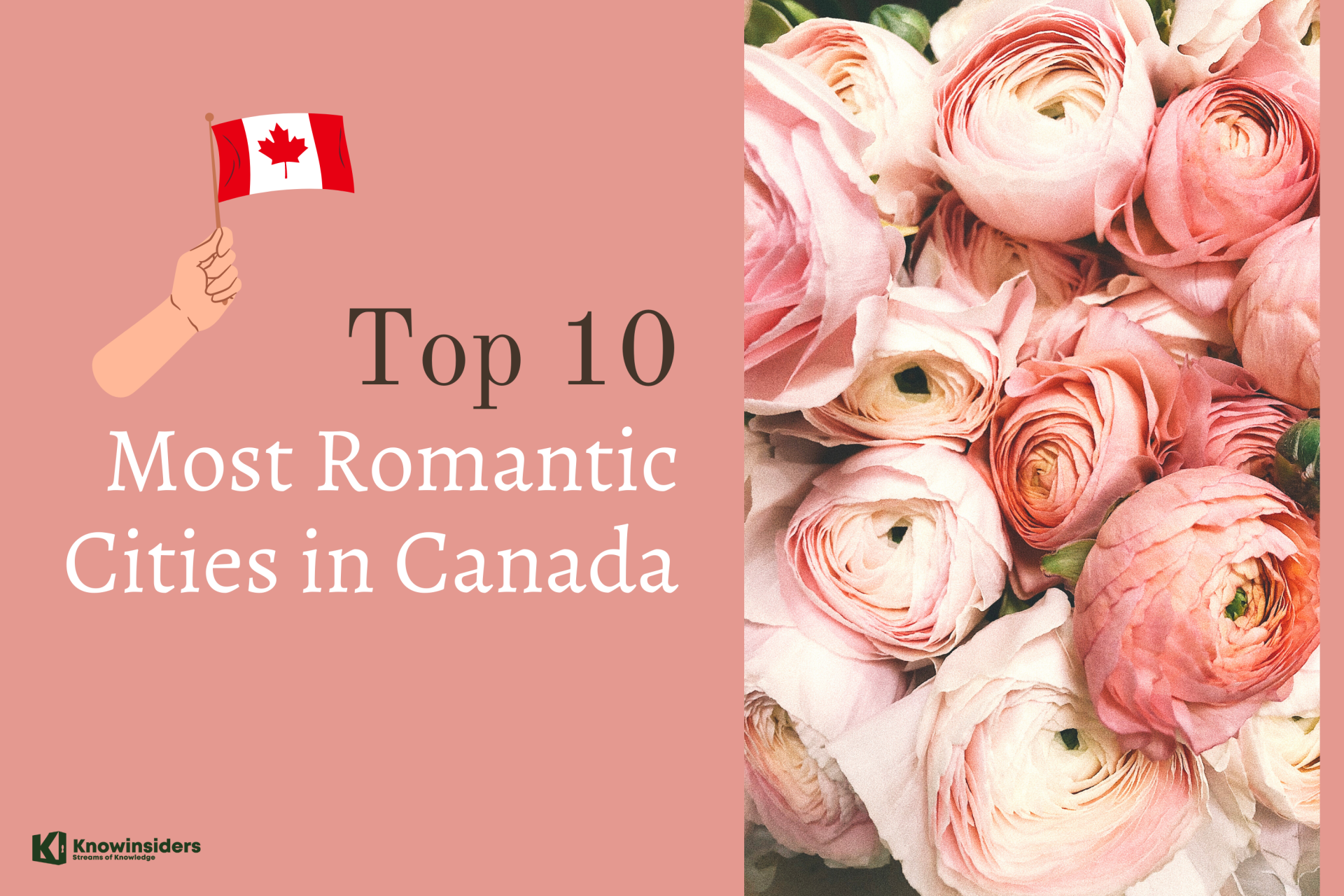 Top 10 Romantic Cities in Canada Top 10 Romantic Cities in Canada Check out KnowInsider's list of the 10 most romantic cities in Canada, which are great for any type of getaway with your better half, whether ... |
 Top 10 Most Romantic Cities in India Top 10 Most Romantic Cities in India To know more about top 10 most romantic cities in India for love getaways, keep reading the article below. |
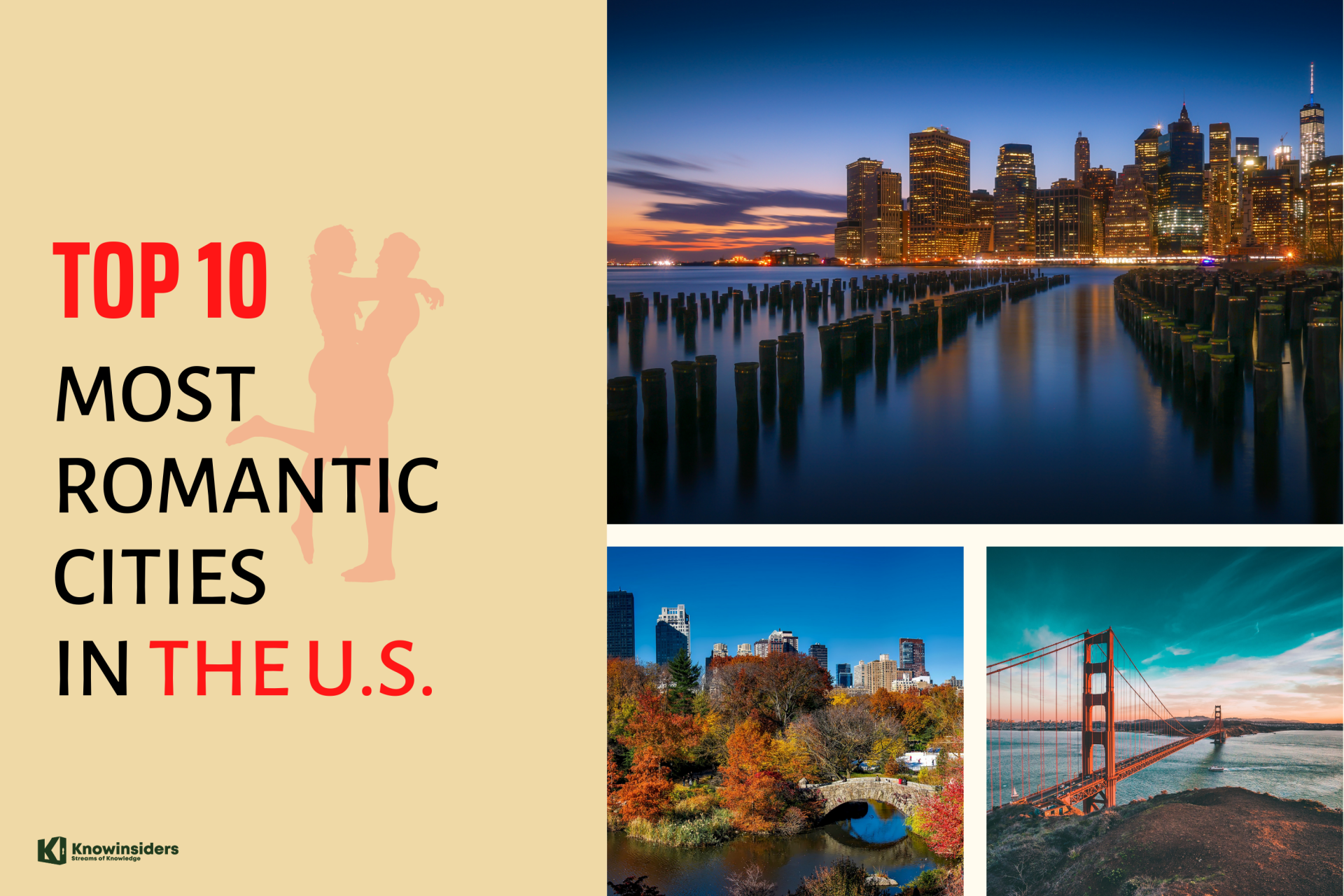 Top 10 Most Romantic Cities in The US For A Couple’s Getaway Top 10 Most Romantic Cities in The US For A Couple’s Getaway From sea to shining sea, across the waves of grain, there are so many destinations that qualify as the most romantic places in the USA. |






